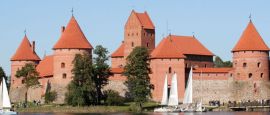Lithuania History, Language and Culture
History of Lithuania
Present-day Lithuanians, along with Latvians and ancient Prussians, are descendants of the Balts, an Indo-European ethnic group that settled on the Baltic coast 4000 years ago.
The formation of Lithuania dates back to around 1009 and the region has endured a series of invasions and conquests by neighbouring countries. In the 13th century the Kingdom of Lithuania was formed and was one of the largest areas in Europe to adopt Christianity. In 1795 Lithuania was taken over by the Russian Empire, and remain under its control until 1918 when it re-established itself as a democratic state.
Its relatively brief life between the wars was dominated by border disputes with Poland and Germany as the former seized the Vilnius region in 1920 and Klaipėda, gained from the latter in 1923, was ceded following a Nazi ultimatum delivered in 1939.
In World War 2 Lithuania was occupied first by Soviet Russia and then by the Nazis until 1944 when the Red Army re-occupied the territory. It’s thougth some 780,000 Lithuanians lost their lives during the war, but although partisans fought a guerrilla action against the Red Army until as late as 1952 Lithuania remained a Soviet republic until the early 1990s when it became the first former Soviet republic to restore its independence and began to develop into an economically strong country. The last Soviet troops left Lithuania in August 1993.
Lithuania is now a full member of the EU, as well as the Council of Europe, and adopted the euro as its currency in 2015. It signed up to the Schengen Agreement, effectively abolishing border controls between members. It also belongs to NATO and in 2013 became the first Baltic state to be elected to the United Nations Security Council.
Since independence Lithuania has upheld its democracy and the current president, Dalia Grybauskaitė – its first female head of state – was elected for a second term in 2014. Lithuanians enjoy one of the lowest rates of income tax in Europe – just 15 per cent.
Did you know?
• Internet speed in Lithuania is among the fastest in the world ranking in the top five for both uploads and downloads according to speedtest.net.
• Lithuanian-born film maker Jonas Mekas is regarded as the godfather of American avant-garde cinema.
• Vilnius is the only city wit three choirs laureates – the Brevis, Jauna Muzika and Chamber Choir of the Conservatoire – reflecting the importance of choral music in Lithuanian culture.




 You know where
You know where